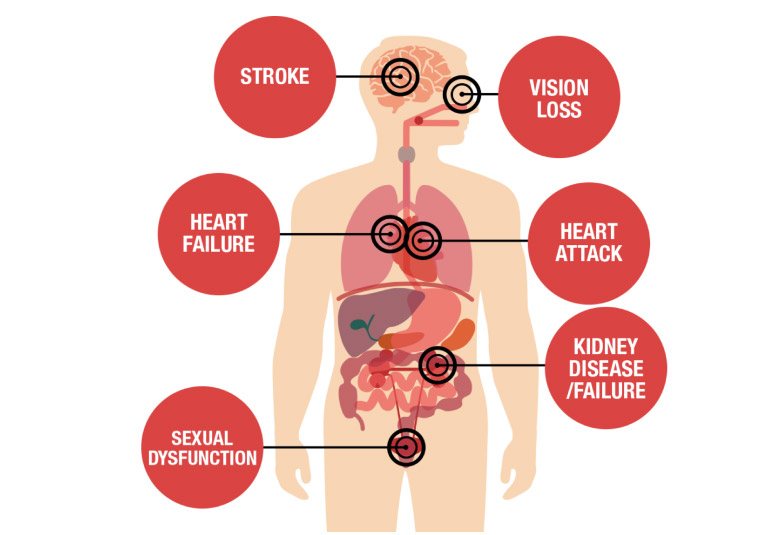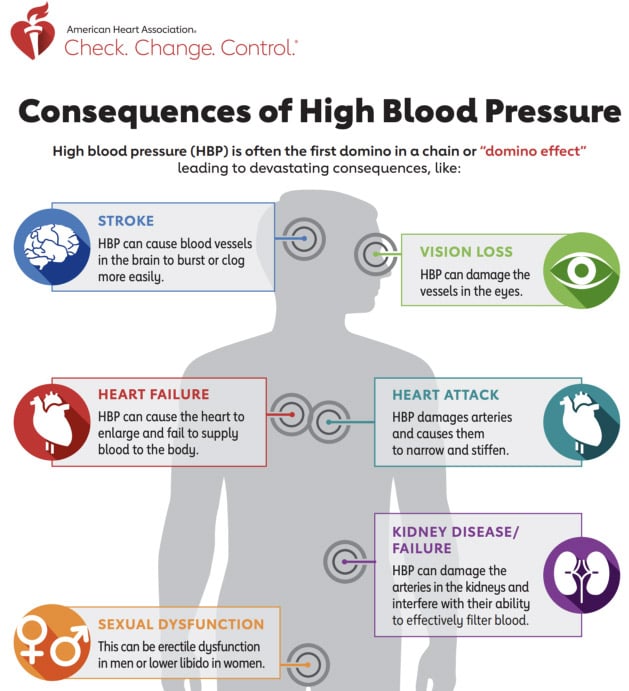Why is high blood pressure bad?

Threats posed by high blood pressure
In most cases, damage done from high blood pressure (HBP or hypertension) occurs over time. When your blood pressure is high for too long, it damages your blood vessels – and LDL (bad) cholesterol heart begins to accumulate along tears in your artery walls. This leads to narrowed arteries and increases the workload of your circulatory system while decreasing its efficiency. Left undetected or uncontrolled, high blood pressure conditions can be life-threatening.
Heart attack – High blood pressure damages arteries that can become blocked and prevent blood flow to the heart muscle.
Stroke — High blood pressure can cause blood vessels that supply blood and oxygen to the brain to become blocked or burst.
Heart failure — The increased workload from high blood pressure can cause the heart to enlarge and fail to supply blood to the body.
Kidney disease or failure — High blood pressure can damage the arteries around the kidneys and interfere with their ability to filter blood effectively
Vision loss — High blood pressure can strain or damage blood vessels in the eyes.
Sexual dysfunction — High blood pressure can lead to erectile dysfunction in men and may contribute to lower libido in women.
Angina — Over time, high blood pressure can lead to heart disease including microvascular disease (MVD). Angina, or chest pain, is a common symptom.
Peripheral artery disease (PAD) — Atherosclerosis caused by high blood pressure can lead to narrowed arteries in the legs, arms, stomach and head, causing pain or fatigue.
Read the labels when shopping. Look for lower-sodium cereals, crackers, pasta sauces, canned vegetables, or any foods with low-salt options. Select foods that have 5% or less of the “Daily Value” of sodium. Avoid foods that have 20% or more Daily Value of sodium.
Eat fewer processed, canned, and packaged foods. Packaged, processed foods account for most of the sodium in people’s diets. If you prepare your own food, you control what’s in it.
Avoid eating out at restaurants since you don’t know what goes into the meal unless if your restaurant posts the nutrition facts for its dishes, check how much sodium is in a serving. There may be lower-sodium options on the menu.
Use salt-free seasonings.
High blood pressure conditions:
Hypertension = High blood pressure (HBP).
High blood pressure symptoms
Except in the case of hypertensive crisis, (a medical emergency when blood pressure is 180/120 mm Hg or higher) high blood pressure does not cause symptoms. Blood pressure is measured in SYSTOLIC mm Hg (lower number) and DIASTOLIC mm Hg (upper number) in the following ranges:
Normal: systolic: less than 120 mm Hg diastolic: less than 80 mm Hg. At Risk (prehypertension) systolic: 120–139 mm Hg diastolic: 80–89 mm Hg High Blood Pressure (hypertension) systolic: 140 mm Hg or higher diastolic: 90 mm Hg or higher
High blood pressure diet
Limiting alcohol and consuming a heart healthy diet plan that is low in sodium and encompasses vitamins and minerals that affect the heart in your nutrition plan enables you to help alleviate hypertension.
The American Heart Association recommends getting less than 2,500 milligrams (mg) of sodium each day, unless you have high blood pressure or if you are at risk (if you have diabetes or kidney disease). Then, the recommendation is that you eat 1,500 milligrams of salt a day. That’s less than a teaspoon from all your meals and snacks.
Pre-packaged heart healthy meals delivered can help clinical nutrition compliance by providing easy, and delicious options you can rely on.
High blood pressure treatment
The best way to know if you have high blood pressure is to have your blood pressure checked.
Make changes that matter. Take steps to reduce your risk and manage your blood pressure. Make heart-healthy lifestyle changes, consume heart healthy meals, take your medication as prescribed and work in partnership with your health care professionals.

Conditions that result from high blood pressure.
Sources:
– American heart association
– Center for Disease Control and Prevention